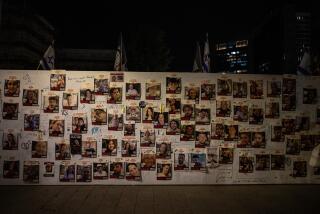General Must Fall on His Political Sword
- Share via
WASHINGTON — Once again, Pakistan is at the center of a South Asian storm. Following a terrorist attack on India’s Parliament building that New Delhi blames on Islamabad, President Pervez Musharraf is working his way toward a new diplomacy. He is trying to stave off Indian retaliation, rearrange the remnants of his country’s old Afghanistan engagements, contemplate new Kashmiri strategies, find a way to combat intolerance at home and weave a path toward renewed relations with the United States.
Embedded in his frantic activity is a brutal irony: Pakistan’s army is squeezing the country into the world’s tightest corner, and although everyone, including the West, is banking on Musharraf’s rule, Pakistan’s survival depends on his capacity to relinquish power and move toward democracy.
Since its founding, Pakistan has been ruled too often by generals whose insecurity and poor judgment have left the country living on edge. The army’s interests--alliances to support nuclear experiments, close relations with China, meddling in Afghanistan and Kashmir and cheer for U.S. interests that did not always coincide with its own--have emboldened the military while exposing Pakistan to every danger that domestic instability and an unstable region could conjure up.
The first casualty of military rule is accountability. When the army patronized extremists to do its bidding in Kashmir and Afghanistan, who could say “no” to misadventures that were endangering the state? When the same extremists broke the law by fomenting hatred and violence at home, the army couldn’t say “no,” either--at least, not without risking its foreign policies. When civil libertarians criticized the links between domestic insurgency and cross-border terror, no one was able to defend them from harassment.
Have things changed since the war against terrorism, the demise of the Taliban, the Indian-Pakistani skirmishes and recurring fears of war?
Judging by Musharraf’s recent speech, the answer is “maybe.” His plea for social progressivism, vague though it was, drew praise from foreigners and sighs of relief from the millions of anxious Pakistanis who have been held hostage to creeping intolerance, violence and, in Musharraf’s words, internal strife that is “eating us up like termites.”
But a speech needs broadly-based policies, or it’s only public relations. Pakistan needs policies that rejuvenate its institutions, and these, in turn, require an engaged public. These are not goods that military governments usually value. Without them, however, the fundamental contradictions within Pakistan’s domestic and foreign policies will easily betray Musharraf’s determination to change course.
When foreign policy is predicated on fraud and terror, when the army advocates policies that require illegal actions to implement, when militant groups have enough resources to challenge the state’s monopoly on force, only a complete house-cleaning will do. Last week, Pakistan’s military government banned more extremist groups, although not enough of them to make a significant difference, and arrested more than 1,000 of their members. But Musharraf has yet to confront his hardest, most important jobs: overhauling foreign policy to protect Pakistan’s people, borders and economy, and ensuring that the fight against internal instability protects the rights of all Pakistanis.
This is why serious politics has to return to Pakistan, so that government can help build a compassionate state where liberty is the foundation for security. Not Musharraf’s politics of constrained public discourse, docile elected bodies and a paternalism mired in old-fashioned feudalism. Rather, Pakistan needs political contests that encourage open debate, enshrine the value of fundamental rights and challenge--finally--the verities that army rule has persuaded civil society to accept for too long.
It would be better, of course, if a political makeover did not emerge from fear of war. Pakistan’s crackdown on religious extremism looks like a response to Indian pushing and U.S. pulling, even though it is Pakistanis who have been trying--and until now, failing--to excise extremism from within. Had Musharraf seriously gone after terrorism when he took office in a military coup in 1999, Pakistan and its neighbors would probably be much safer, peaceful places. Instead, even some of Pakistan’s embattled liberals now fear that Musharraf is as good as they will get from an army laced with militancy.
This is why army rule has to go--because Pakistanis should be able to choose, not cower and compromise. If Musharraf truly believes his words, then he will ultimately have to stand habit on its head and, like enlightened authoritarians elsewhere, do himself out of his job.
This is why Musharraf’s patrons in London and Washington need to measure their actions with care. For the moment, Musharraf may seem like a pliable autocrat who sounds like a politician and thinks like a general.
But those who believe that terrorism can only be countered by military strongmen should take another look at Pakistan, where authoritarianism and army rule have consistently fostered instability and insecurity. And then they should ask how long Pakistanis should pay for short-term thinking and politically empty, military-dominated partnerships.
In the past, political change has come to Pakistan in the wake of war, assassination and tectonic shifts in international politics. If the silver lining in today’s South Asian conflicts is a belated recognition that civilians should run armies and armies should not run states, then we may all be a bit wiser and much, much safer.
*
Paula R. Newberg is an international consultant who works in conflict-affected regions and writes regularly about politics in South Asia.
More to Read
Sign up for Essential California
The most important California stories and recommendations in your inbox every morning.
You may occasionally receive promotional content from the Los Angeles Times.













